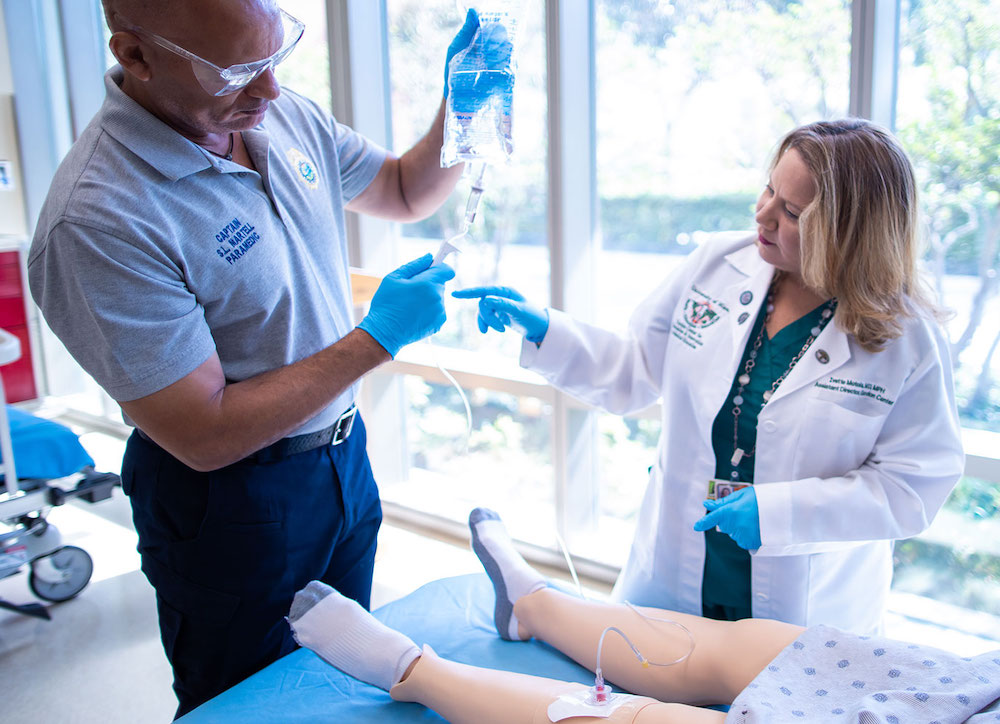Gordon Center Offers Powerful Curriculum for Clinical Simulation Learners
At the heart of The University of Miami Health System’s Michael S. Gordon Center for Simulation and Innovation in Medical Education, or Gordon Center for short, is the mission to save lives with education, innovation and healthcare simulation. With that aim, the Gordon Center developed a series of online curricula for healthcare providers and students around the world to improve patient outcomes and save lives. Here we take a closer look at the powerful curriculum, unique learning programs, powerful simulators, and leading courses available from the Gordon Center!
The Gordon Center, which used to go by the acronym GCRME, offers various training programs such as cardiology, and emergency medicine on blending learning platforms, a combination of online interactive educational programs along with face-to-face classroom methods. These methods allow students to control the place, path, or pace of their learning. In addition, education material developed by the Gordon Center is based on the latest national surveys and guidelines from certification boards such as the American Academy of Neurology and American Board of Emergency Medicine.
But what makes Gordon Center curricula different are the realistic “case-based,” multimedia scenarios that emphasize humanistic aspects of medicine, such as communication skills, bedside manner and medical ethics, in addition to diagnosis and management. Innovative tools are incorporated in the learning experience and include simulations, videos, interactive graphics, animations, diagnostic images. In some courses included is hands-on practice with Harvey, the cardiopulmonary simulator and a range of other clinical simulation systems.
Sponsored Content:
Whether its diagnosing acute stroke, managing heart attacks, treating pediatric airway emergencies, applying emergency medicine core principles or simply taking a blood pressure reading, the Gordon Center curricula will prepare learners for the next level of patient care.
The online curriculum is modular and customizable for the student’s specific needs. These ready-to-launch courses offer assessment tools, self-learning components, and multiple learning activities. With a site license, the school or medical facility can train hundreds of students, residents, physicians, physician assistants, nurses and nurse practitioners a year at a nominal cost.
Upon completion, students of the Gordon Center curricula will be better prepared to diagnose and treat a variety of clinic conditions and be more confident in their practice.
Teaching Programs from the Gordon Center
Sponsored Content:
The Gordon Center, courses are known for their emphasis on skills training, interactive teaching and patient simulation through both technology and standardized patients – actors who portray patients. Using realistic “case-based” scenarios to teach healthcare professionals facilitates the discussion of the humanistic aspects of medicine, such as communication skills and medical ethics, in addition to diagnosis and management. The Gordon Center offers medical student teaching programs in introductory clinical skills, cardiology, and emergency medicine. The Gordon Center also houses cardiology educational programs for cardiology fellows, residents in internal medicine and family medicine, physician assistants, and nurse practitioners, and neurology programs for residents in internal medicine. Programs available from the Gordon Center include Clinical Cardiology Electives, Nurse Training Programs, Introduction to Laerdal’s SimMan and SimBaby, as well as their world famous partnered iSim debriefing course.
Emergency Medical Skills Training Program
The Gordon Center’s Emergency Medical Skills Training Programs also began over 35 years ago. They now train thousands of course registrants per year at nearly 700 agencies in Florida and over 1,000 in other states, as well as internationally. Courses address multiple content areas, including cardiac life support, trauma, pediatrics, stroke, heart attack, advanced airway, team training, rapid response and disaster response. Paramedics diagnose problems using actors to play the role of patients. They are the designated lead training center for the Florida Department of Health’s Emergency Response to Terrorism training program. The curricula are disseminated to Florida’s state and community colleges, and the paramedics trained at the Gordon Center respond to the 911 calls of millions of Floridians. They also train the U.S. Army Forward Surgical Teams prior to their front-line deployment and healthcare personnel from other high level federal agencies.
Each curriculum developed at the Gordon Center is the work of respected clinicians and educators, reflects the most current science, and undergoes rigorous review by content experts and professional evaluators to ensure adherence to the highest of standards. Instructors trained in their programs, “Advanced Stroke Life Support”, “Emergency Management of Acute Coronary Syndromes”, “Airway Management – Principles and Practice”, and “Emergency Response to Terrorism”, teach the curricula at colleges and training programs for prehospital and hospital providers throughout the state of Florida, the United States, and abroad.
Harvey, the Cardiopulmonary Patient Simulator
This full-size manikin realistically simulates nearly any cardiac disease at the touch of a button by varying blood pressure, pulses, heart sounds, murmurs and breath sounds. Harvey is the longest continuous university-based simulation project in medical education, and no other simulator presents cardiac bedside findings at the level of detail and fidelity found in Harvey.
Harvey provides a comprehensive cardiology curriculum by realistically simulating 50 patient scenarios. It is structured to begin with common, less complex conditions and progress to more rare and complex diseases. Some patient scenarios are available in both 60 & 90 bpm with corresponding respiratory rate changes of 12 & 15 rpm, respectively.
Harvey is portable and may be used in any environment in which a patient may be examined. Using stethophones, small groups may learn without an instructor by using the slide programs or the UMedic system. Harvey may also be used in clinical skills or simulation training centers or SP training areas. Larger groups by using stethophones for auscultation, and video projection for observing other physical findings. Most important, Harvey’s location should be convenient for students, faculty and staff. Even though Harvey functions as a self-learning device, the nearby presence and availability of knowledgeable faculty and staff will further ensure a successful program.
Harvey teaches many thousands of learners annually at over 600 institutions worldwide. The American College of Cardiology Task Force on Teaching has recommended Harvey for training, the British Heart Foundation has placed the simulator at nearly all of the medical schools in the U.K., and the American Board of Internal Medicine uses videos of Harvey its computer-based skills recertification examination. The Royal College of Canada has used Harvey for its high-stakes internal medicine certification examination.
Visit the Gordon Center’s Website to Learn More!
Sponsored Content:

















